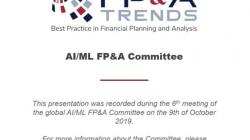Starting with the end in mind is one of the simplest ideas that is frequently ignored. I have seen so


Would you rather be liked or respected? It is a question we often get asked in interviews or from our direct
In this article, we will look at how driver-based advanced analytics has overcome the problems with the current budgeting process

When we talk about performance measurement, KPIs are a common tool. It can be a financial measure or an operational
At the sixth meeting of the AI/ML FP&A Committee, Saul Mateos, Finance Director at Coca Cola (previously Senior FP&A Director

Finance transformation is high on the agenda for the majority of finance departments. What is driving this? There are a
Pagination
Subscribe to
FP&A Trends Digest

We will regularly update you on the latest trends and developments in FP&A. Take the opportunity to have articles written by finance thought leaders delivered directly to your inbox; watch compelling webinars; connect with like-minded professionals; and become a part of our global community.







